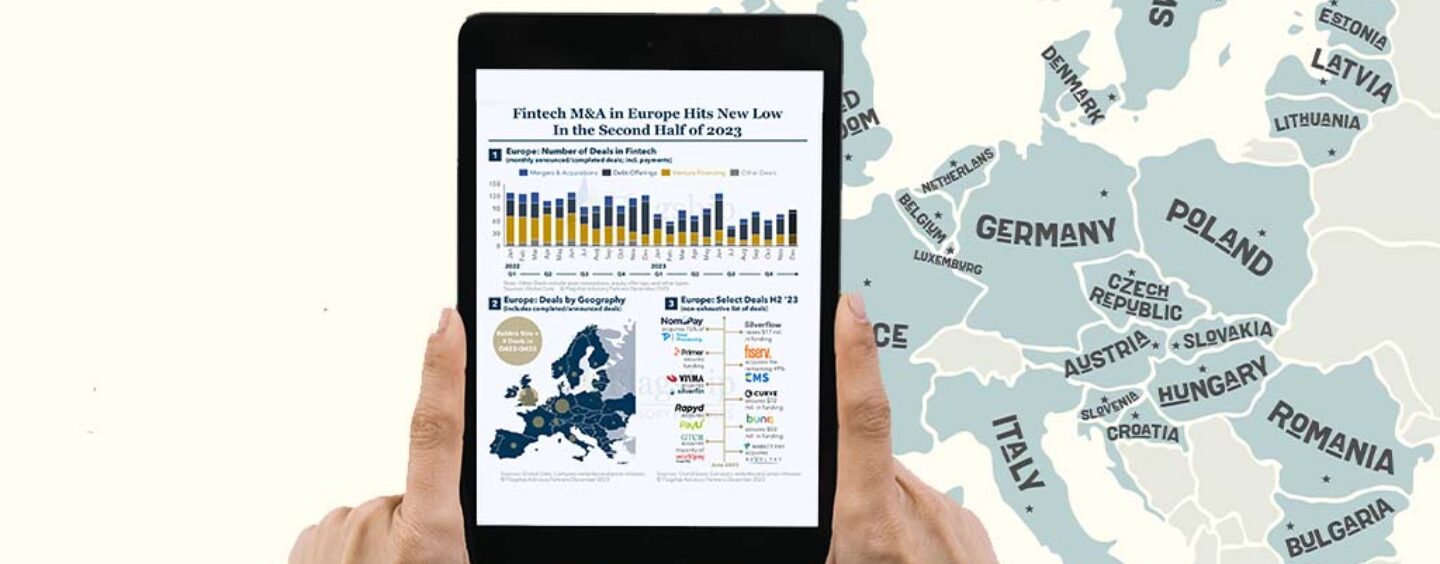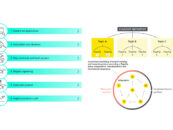
European Fintech M&A Poised for Rebound as Traditional Banks Eye Struggling Fintech Startups
by Fintechnews Switzerland March 25, 2024Mergers and acquisitions (M&A) activity in the European banking sector is expected to rebound this year as lower valuations are anticipated to entice traditional lenders to snap up struggling fintech startups to enhance their tech capabilities and expand their portfolio of products, a new report by market data and intelligence platform S&P Global Market Intelligence says.
While 2023 was a lackluster year for dealmaking in the European banking sector, 2024 is presenting favorable moves in inflation data and introducing strong prospects of joint ventures and partnerships with fintech startups.
In 2023, fintech M&A deals globally totaled US$29.92 billion, down by more than 20% from US$37.56 billion in 2021 and by a staggering 60% from the all-time high of US$76.15 billion recorded in 2021, data from S&P Global Market Intelligence show. Deal count also plummeted, pulling back 41% between 2022 and 2023 to 261. The figure is half of the number of fintech M&A deals in 2021 of 572.

Fintech and payments M&A deals announced since 2021, Source: S&P Global Market Intelligence, Jan 2024
Looking at the European market in particular, data from Flagship Advisory Partners reveal that fintech M&A in Europe hit a new low in H2 2023. This pullback was driven in large part by challenging macro-economic conditions with high inflation and interest rates, and was further amplified by fintech stakeholders refusing to lower valuations, the fintech consulting and M&A advisory firm says.

Fintech M&A in Europe, Source: Flagship Advisory Partners, Dec 2023
In 2023, several deals fell through, but this year promises new strategic opportunities in fintech M&A. As many fintech companies will continue to struggle for profitability and grapple for capital, banks will look to capitalize on stressed situations to acquire valuable assets at a discount to enhance their services, reach new customer segments and stay competitive, the S&P Global Market Intelligence report says.
Payment is expected to be one area of particular focus, driven by the growing need for modernization. “As the payments chain becomes more digitized, it’s likely to be to an extent disruptive to M&A markets, and we think that presents a potential opportunity,” Tom Macdonald, head of banking at Deloitte, told S&P Global Market Intelligence.
“It is a sector where stock markets have repriced many of those institutions, which perhaps could lead to more [M&A] activity.”
Activity in payments has already begun in 2024 with French lender Credit Agricole buying a 7% stake in Paris-based payment group Worldline, a deal that came after Worldline’s share price fell nearly 70% in a year, the report notes.
There will also be demand for deals in specialty finance, such as mortgage lending, and investment banking as European banks look to strengthen their positions by expanding growth areas or by adding new capabilities.
This was the case for Deutsche Bank, which purchased investment bank Numis in October 2023, to expand overseas; as well as for Credit Agricole’s Indosuez Wealth Management, which acquired in August 2023 a majority stake in Bank Degroof Petercam, a European wealth manager, to access growth without relying on costly and scarce capital.
Additionally, European banks will likely seek to consolidate to compete more effectively against the growing market share of North American investment banks on the continent. Reports suggesting that Deutsche Bank was considering taking over ABN AMRO Bank and Commerzbank are hinting at that, indicating that 2024 could be a year of large-scale mergers in the European banking industry, the S&P Global Market Intelligence report says.
American law firm White & Case expects that in 2024, European banks will continue to heavily invest in digital transformation strategies to not only meet customer demands and enhance customer experience, but also better manage costs and mitigate risks.
The firm says that top technologies are now “must have” tools as banks face escalating costs from traditional brick and mortar product delivery models, increasing sophistication of cyberattacks and financial crime penetration, as well as fierce competition from digital challengers and neobanks.
White & Case forecasts that while new entrants in the tech market may find it challenging to secure financial sponsor or bank equity in 2024, investor appetite will remain strong for technology that enhances existing business lines, addresses cybersecurity concerns, or improves regulatory compliance.
Featured image credit: Edited from freepik





